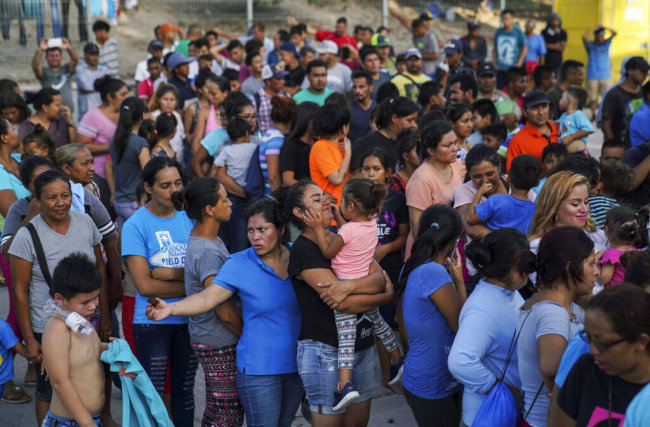Biden to slowly allow 25,000 people seeking asylum into U.S.
The Biden administration on Friday announced plans for tens of thousands of people who are seeking asylum and have been forced to wait in Mexico under a Trump-era policy to be allowed into the U.S. while their cases wind through immigration courts.

Migrants, many of whom were returned to Mexico under the Trump administration's "Remain in Mexico" policy, wait in line to get a meal in an encampment near the Gateway International Bridge in Matamoros, Mexio, Aug. 30, 2019. [File Photo: AP]
The first wave of an estimated 25,000 asylum-seekers with active cases in the “Remain in Mexico" program will be allowed into the United States on Feb. 19, authorities said. They plan to start slowly, with two border crossings each processing up to 300 people a day and a third crossing taking fewer numbers.
President Joe Biden's administration declined to publicly identify the three crossings out of fear it may encourage a rush of people, but U.S. Rep. Henry Cuellar, a Texas Democrat, said officials told him that they are Brownsville and El Paso in Texas, and San Diego's San Ysidro crossing.
The move is a major step toward dismantling one of former President Donald Trump's most consequential policies to deter asylum-seekers from coming to the U.S. About 70,000 asylum-seekers were enrolled in the program officially called Migrant Protection Protocols since it was introduced in January 2019.
On Biden's first day in office, the Homeland Security Department suspended the policy for new arrivals. Since then, some asylum-seekers picked up at the border have been released in the U.S. with notices to appear in court.
Biden is quickly making good on a campaign promise to end the policy, which the Trump administration said was critical to reversing a surge of asylum-seekers that peaked in 2019. But the policy also exposed people to violence in Mexican border cities and made it extremely difficult for them to find lawyers and communicate with courts about their cases.
“As President Biden has made clear, the U.S. government is committed to rebuilding a safe, orderly, and humane immigration system,” Homeland Security Secretary Alejandro Mayorkas said. “This latest action is another step in our commitment to reform immigration policies that do not align with our nation’s values.”
Asylum-seekers will be released with notices to appear in court in cities close to or in their final destinations, typically with family, administration officials said.
Homeland Security said the move “should not be interpreted as an opening for people to migrate irregularly to the United States.” Administration officials say the vast majority of people who cross the border illegally are quickly expelled under a public health order that Trump put in place in March amid the coronavirus pandemic. But some asylum-seeking families have been released in Texas and California, working against that messaging.
White House press secretary Jen Psaki said Thursday that she was concerned limited releases in the U.S. may encourage others to cross illegally.
“We don’t want people to put themselves in danger at a time where it is not the right time to come, because we have not had time to put in place a humane and moral system and process,” she said.
Court hearings for people enrolled in “Remain in Mexico” have been suspended since June because of the pandemic. Getting word to them about when to report to the border for release in the United States may prove a daunting job.
Homeland Security said it would soon announce a “virtual registration process” online and by phone for people to learn where and when they should report. It urged asylum-seekers not to report to the border unless instructed.
The International Organization for Migration will help with logistics and test asylum-seekers for COVID-19 before they enter the U.S., spokeswoman Liz Lizama said. The U.N. migration agency's Mexico director, Dana Graber Ladek, said last month that it would seek to inform and support asylum-seekers on any changes in the “Remain in Mexico” policy.